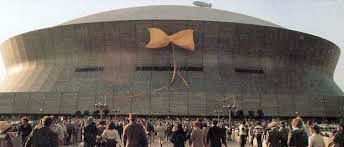Super Bowl XV - Philadelphia Eagles vs Oakland Raiders: Pregame
In 1978, Jim Plunkett was at a crossroads in his football career and his life.
- Plunkett won the Heisman Trophy his senior year at Stanford and became the #1 pick in the 1971 NFL draft. But after five mediocre (at best) seasons with the Patriots, he was considered the poster child for First Round Draft Busts. He struggled with injuries and a shaky offensive line, with touchdown passes going down and interceptions increasing year after year.
- A return to the West Coast for two years with San Francisco started promisingly as the 49ers won six of their first seven games in 1976. But they faltered and finished 8-6. After a 6-9 season in '77, the 49ers released him.
- At that point, "I was at pretty much the depths of my career," Jim recalled. "It was really hard to take, and I wasn't full of optimism or enthusiasm." Oakland GM Al Davis offered him a contract. "Since I was back in the Bay Area, I thought I would hook on with the Raiders rather than packing my bags and going where it was cold, back east or to the Midwest."
- Raiders coach John Madden "sat me down and talked to me. He said, 'Every other place you've been, you've had to come in and be the savior. Here we have an established quarterback (Ken Stabler), so you've just got to learn the system and watch and listen and be prepared when your time comes."
- His time didn't come until 1980. After not playing a down in the '78 season, he appeared in only four games in '79, none as a starter. When Stabler had a falling out with Madden and Davis, they traded him to Houston for QB Dan Pastorini. That was the last straw for Plunkett. "Since Dan had been a starter there (Houston), he was going to be a starter here, and I wasn't given an opportunity to even compete for the position. As good as I was throwing, I felt slighted. Also, since this was my tenth year in the league, I worried that if I wasn't given a chance to play then, I might never get it. So I asked to be traded before the start of the season." But new coach Tom Flores and Davis said that "they couldn't afford to let me go. ... I was the only experienced backup they had. So they didn't trade me - fortunately for them, fortunately for me."
Madden had resigned as head coach in 1978 after ten seasons. As one writer put it, "Burned out, perhaps by his own energy, Madden decided he'd be happier crisscrossing America by bus and turned into a Sunday afternoon TV pundit." So Davis promoted Flores, his wide receivers coach, to the top job. Compared to the garrulous Madden, the players considered Flores more aloof and standoffish.
- As luck would have it, Pastorini broke his leg in the fifth game. So Plunkett finally got his chance. And, boy, did he take advantage of it. He led the Raiders to six straight victories before losing at Philadelphia 10-7 in a game in which Jim was sacked eight times. The Raiders won three of their last four games to finish 11-5 and make the expanded playoffs as a wild card team. Plunkett's 72.9 QBR (as retroactively computed) was the highest of his career to that point.
- A big reason for Jim's newfound success was one of the best offensive lines in the league. LT Art Shell, a 12-year veteran, and LG Gene Upshaw - 13 years on the job - formed an unbeatable tandem. Both made the Pro Football Hall of Fame. C Dave Dalby provided protection up the middle, and G Mickey Marvin and T Henry Lawrence were solid on the right side. At New England, Plunkett didn't have "the luxury of holding onto the ball while waiting for our receivers to break free ... Quarterbacks tend to get rid of the ball earlier, but Oakland wanted us to give Cliff Branch and Bobby Chandler the time to get deep downfield and beat their men."
The Raiders had long had the reputation of being a bizarre group of bad boys. But Plunkett quickly learned that his teammates were serious about playing football. "When they stepped on the field, they were ready to go to war and get the job done. A lot of things happened during the course of that season - missed practices and stuff - but it didn't seem to bother anybody on game days. If guys had been out drinking at night, they wouldn't try to get out of practice by saying they had bad hamstrings when they really had hangovers ...These guys paid their dues."
Jim continued, "The Raiders had the image of being misfits ... We had a crazy bad-boy reputation and sometimes the guys tried to live up to it." But he added, "They were loyal to their uniform and sincerely felt that being a Raider was the best thing in the world ... I could sense this attitude as soon as I got there, and I got caught up in it and had a great time. I never ran around with a team that had such strong camaraderie."
- By the end of the regular season, "I thought we were the best team in football," recalled Plunkett.
The Raiders proved him right by winning three playoff games to take the AFC title.
- They began with an easy home win over the Oilers and their old pal Stabler 27-7.
- Then they went to Cleveland and upset the Browns in frigid weather, 14-12, thanks to Mike Davis's interception of Brian Sipe in the end zone in the last minutes.
- That set up the third meeting of the year with the San Diego Chargers. The home team had won each of their two regular season meetings. The Chargers got the AFC West #1 seed due to the new tie-breaking formula. So they hosted the conference championship game. Plunkett was magnificent, completing 14-of-18 for 261y, 2 TDs, and 0 INTs. His 155.8 passer rating more than doubled Dan Fouts's 70.2. The result was a 34-27 Raider victory and a berth in the Super Bowl - the first ever for a wild card team.
No team reaches the Super Bowl without having a solid defense.
- Mike Davis, the savior of the Cleveland game, was one of four youngsters who started with seven veterans. The other three newcomers were Reggie Kinlaw, a 12th-round pick who seemed tailor-made for anchoring the Front Three at NT. Dave Browning, in his third season, started every game at RE. Seven-year veteran John Matuszak held down LE.
- 6'7" LOLB Ted Hendricks, the "Mad Stork," was the prototype for LBs of today's football - guys who can stop the run and rush the passer but also can drop back in coverage. Hendricks had three INTs and four fumble recoveries. The LILB was Matt Millen. Despite being a rookie, Matt called the defensive signals.
- The ROLB was another Cinderella story. Rod Martin was a 12th round pick in 1977 based solely on the recommendation of his USC coach, John Robinson. He was traded to San Francisco in the preseason as a rookie but returned to Oakland later in the year after being cut by the 49ers. At 210lbs, Rod was considered too small to be a linebacker and not fast enough to be a safety. But he worked hard to improve his strength and speed and contributed on special teams in '79. Then he blossomed in 1980, not only earning a starting spot but becoming one of the team leaders.
- The standout in the secondary was LCB Lester Hayes, who led the league with 12 INTs. He covered his hands and forearms with "Stickum," a glue-like substance that, as one writer put it, "turned him into a six-foot strip of flypaper." If Hayes got a hand or forearm on the ball or even if it just hit his jersey, he had a good chance to corraling it because of the glue.
The next season, the NFL banned the use of Stickum. The rule was widely referred to as the "Lester Hayes Rule." Plunkett recalled Hayes as "a talker, on and off the field. Because of his stuttering, when he was being funny, it was even funnier." He was always coming up with something, either giving somebody a nickname or relating a silly story - he kept me in stitches."
The NFC champions were a "blue collar" team like the Raiders but with a decidedly different team personality.
- After the Philadelphia Eagles won the 1960 NFL Championship, the franchise went 17 seasons without making the playoffs.
- The architect of Philly's resurgence was Dick Vermeil. He attracted the interest of new Eagles' new GM Jimmy Murray by leading UCLA to an upset over #1 Ohio State in the 1976 Rose Bowl.
At first Dick said he wasn't interested. "Why would I give this up for Philadelphia? Why leave California? I love UCLA. I'd be crazy."
Murray told him, "We got a great town, great fans, we sell out the stadium win or lose, they even go nuts when we win a coss toss. There's no place to go but up."
Shortly thereafter, Vermeil called Murray and asked for a second interview.
- The turnaround didn't come fast or easy. Because of past trades, the Eagles had no first round picks until 1979. They finished Vermeil's first season, 1976, with the same record as the year before, 4-10. '77 saw a one game improvement to 5-9.
- They went 9-7 in '78 - the franchise's first winning season since 1966 but lost in the Wild Card round. The next year, they improved to 11-5 to tie Dallas for first in the NFC East. But, like the '80 Raiders, Philly took a wild card spot because of the tie-breaking formula. They beat the Bears 27-17 in the first round before losing at Tampa Bay 24-17.
- Everything came together in 1980. Spearheaded by a defense that gave up the fewest points in the league and was second in yardage allowed, the Birds flew to the top of the NFC East standings, tying the Cowboys with a 10-4 record. This time, the Eagles got the higher seed and had home field advantage. After a bye week, they whipped the Vikings 31-16, then beat the Cowboys 20-7 in the NFC title game to earn the franchise's first trip to the Super Bowl.
The makeup of the Philadelphia roster showed what a masterful job Vermeil did of putting together a championship team. 14 players were free agents. Ten more were acquired through trades or waivers. Of the 21 draft picks on the roster, only three were selected in the first round.
Rifle-armed Ron Jaworski led the Philly offense.
- Vermeil obtained Ron in a trade with the Los Angeles Rams in Dick's second year as head man. Jaws' TD/INT ratio improved from 18-21 in '77 to 16-16 in '78 to 18-12 in '79.
- Jaworski spread his passes almost equally among WRs, TEs, and backs:
WR Harold Carmichael - 48 receptions
WR Charlie Smith - 47
TEs Keith Krepfle and John Spagnola - 48 catches between them
RB Wilbert Montgomery - 50
- The Eagles achieved a good balance of runs and passes: 527 rushing attempts vs 477 passes.
Defensive coordinator Marion Campbell's unit was led by LILB Bill Bergey, an 11-year veteran.
- The Eagles long-awaited first round pick in '79, Jerry Robinson, took over at ROLB for the 1980 season, and their first round pick in '80, Roynell Young, started immediately at LCB and snared four INTs.
- Claude Humphrey, a 36-year-old former Pro Bowl end who Vermeil lured out of retirement, led the team with 14 sacks.
- Two defensive linemen, Carl Hairston and Charlie Johnson, were seventh-round choices. NT Ken Clarke and CB Herman Edwards weren't drafted at all.
- Hard work and discipline were the foundation of Vermeil's program. Practices routinely lasted three hours. Coaches meetings went through the night. Dick slept in his office four nights a week.
"I always had a sense that we were moving in the right direction," said Bergey, an All-Pro linebacker. "Even in the early years (under Vermeil) when the wins were few and far between, we could see the intensity of the play picking up. Dick's personality rubbed off on us."
Spagnola put it this way: "It was like being in a time warp. You practiced, you got chewed out, you watched film. You practiced, you got chewed out, your watched film. Over and over, every day. In a strange way, it brought us all together. ... But Dick saw things in each of us that we didn't see in ourselves. He knew we could be better than we were, and he was pushing us to bring out that (ability). That's the mark of a great coach, someone who can reach down and pull something out of you that you didn't even know was there."
Bergey added, "I realized later it was all a test. Dick was getting rid of the whiners and the loser and finding guys who were tough enough to play his brand of football. Once he achieved that, once he had his team, we took off."
The two coaches took contrasting approaches to the week of practice in New Orleans before the game.
- With two weeks between the conference championship games and the Super Bowl, Vermeil took his Eagles to sunny Tampa for a week before heading to New Orleans seven days before the game as required by the NFL.
- Dick's preparation plan for the Super Bowl mimicked what he did to prepare his UCLA squad for their upset of Ohio State in the Rose Bowl. He kept the Bruins focused on the game with a series of long practices.
- The Philly players weren't surprised. WR Harold Carmichael: "We had been like that all year for every game ever since Dick came in. A lot of times, we would have meetings by the second training camp up until bed check."
- When the Eagles landed in New Orleans, Vermeil bused them directly to the practice field. All week, Philly went through lengthy workouts, then retreated to their hotel rooms for the evening.
- Dick defended his practice regimen. "We normally practice three hours and 15 minutes. We're down to two hours now. It's like a vacation. We don't have any bedchecks, but I recommend they stay out of Bourbon Street. I hope they'll be in bed by 11. They've all come down here for one thing. To win a football game. We might never get down here again. We might get only one chance."
One reporter described Vermeil as "a cross between George Allen and Chuck Noll, all X's and O's and concerns about distractions. The perfectly molded coach out of central casting seemed uptight, like a prime candidate for burnout."
Prone to micromanaging his team - as one writer put it, "he did his job and everybody else's," Vermeil would last two more seasons in Philadelphia before resigning due to "burnout."
- Flores, on the other hand, let his players enjoy the Crescent City night life. After consulting his captains, he set an 11 p.m. curfew starting Tuesday for the rest of the week.
- "Tom said that this is New Orleans, and we're going to have a good time," Martin said. "We were not going to get the curfew on us the whole time. He let us be relaxed and go out to enjoy the festivities, but he told us the main reason why we were here was to win the Super Bowl. We didn't jeopardize what we came there to do."
John Matuszak was caught out partying at 3 a.m. Wednesday. Flores recalled, "The next day, I bring him in. He said, 'Coach, I was just out making sure everybody else was getting in.' I did everything I could to keep from smiling and laughing. I said, 'Get out of here. Behave.' He said, 'It won't happen again. It was my night out, Coach.' So I fined him, and that was the end of it." Reportedly, Flores collected $1,500 in fines that week, $1,000 from Matuszak alone.
Word also spread that WR Cliff Branch had been fined $1,000 back in Oakland for missing practice eight days before the Super Bowl.
One Raider who was not out on the town was Plunkett. "After going to Bourbon Street on Monday, ... I literally locked myself in my room. I tacked a big sheet on my wall and using my project I went over every piece of film the Raiders staff had put together, making sure that on every situation that came up, I knew exactly where to go with the football. I looked for every advantage, from a safety cheating over or a cornerback taking an inside position, knowing that if he does it's probably a blitz."
- Cliff Branch believed Flores's approach helped the Raiders play better come Sunday. "We were a very confident game. From Day One, they had curfew every night. We didn't have curfew until the night before the game. We were a very loose and confident group of guys."
Matt Millen recalled, "We were getting phone calls from other [NFL] players, saying we had to win this game. Guys were saying, 'If the Eagles win, then every owner will want a coach like that. We'll all be practicing four hours a day next year.' Nobody wanted that. To a man, we felt we would beat Philadelphia. We felt we should've beaten them the first time we played. Their offense did nothing in the game. We blew one coverage that set up their only touchdown. We shut them down otherwise."
- Vermeil was flabbergasted when he heard about the Raiders' partying four days before the big game. "If I had a player who broke curfew," he said, "he'd be home now." Told of the Dick's response, Raider G Gene Upshaw said, "If Tom Flores sent home every guy on this football team who screwed up, he'd be the only guy on the sideline."
- But the Philly coach worried about his team's readiness. He told a pool reporter after a 25-minute Saturday workout in the Superdome: "I get the feeling that the men are getting a little uptight. I can't put my finger on it, but they are not as loose and as relaxed as they were Friday."
Privately, Vermeil was concerned about matchups and injuries. "We did not match up very well, especially from a wide receiver point of view. First off, the Raiders had great corners. Secondly, our starting flanker back, Charlie Smith, broke his jaw in the championship game. Then my number three receiver, Scott Fitzkee, was out with a stress fracture in his leg, so we had to go with our numbers one and four receivers. I'm not making excuses, but it negatively impacted our approach to the game."
A subplot for the Super Bowl involved the feud between Oakland owner/GM Al Davis and NFL Commissioner Pete Rozelle.
- Spurned in his attempt to have improvements made to the Oakland Coliseum, Davis wanted to move his Raiders to Los Angeles, but the NFL owners voted 22-0 (with five abstentions) against the move.
- When Al tried to move the team anyway, he was was blocked by a court injunction. In response, he filed an anti-trust lawsuit against the NFL, demanding $160 million in damages. The case was still in the courts.
- Rozelle had called Davis "divisive" and an "outlaw" at various times.
- Reporters wondered, If Oakland won the game, would Rozelle present the trophy to Davis? It promised to be a juicy moment.
Las Vegas's chief oddsmaker installed Philadelphia as a three-point favorite, and the line didn't move for ten days.
- That didn't bother the Raiders in the least. They had been underdogs in each of their three playoff victories.
- Plunkett had endured a terrible against the Eagles in November: 10 for 36, 2 INTs, 0 TDs. "We made some mistakes," he said after that game, "but it's not the end of the world. We'll bounce back."
Jim described his feelings heading into the Super Bowl like this: "I didn't really have expectations. I knew I was going to go out there and execute my end of it. ... I was going to get rid of the ball quicker; I was going to make sure that my linemen wouldn't have to block for great lengths of time, play after play. I was going to go to some quick three-step drops and get rid of the ball ... I was going to mix it up and keep the Eagles off balance as much as I could."
- The Oakland offensive line also had a chip on their shoulders after allowing eight sacks in Philadelphia. RT Henry Lawrence told the media, "Watch this game carefully. Last time they did things to us that they won't do this time. They stopped our running, but they won't do it Sunday. They won't get to Plunkett."
The Raiders' Wednesday workout (defense day) set the tone for the week. FS Burgess Owens revealed after the Super Bowl that it "was so intense and vicious that I thought Tom would have to call it off." Gene Upshaw got into a brief punching match with DE Dave Browning. "It always involves punches," said Upshaw. "These are the Raiders, remember?"
Thursday
(offense day) was also combative. This time Upshaw's sparring partner was backup DT Phil Livingston. "Go hard," Al Davis told the rookie. "Make him work." "I tried to kick him," Upshaw admitted. "I don't want to say where, but all the regulars got mad at me because the kid had just gotten married. I apologized."
- LB Rod Martin spoke of his unit's confidence going into the rematch. "We had a great game that day defensively. We figured we might see them somewhere else later down the road somewhere. We looked at the film and how we played them and just made a lot of adjustments."
Like Plunkett, Martin put his time in New Orleans to good use. "People on Bourbon Street saw us having a good time, but what they didn't see was whenever I got back to the room at midnight, one o'clock, two o'clock, I put the projector on and studied film of the Eagles, looking at tendencies from their different games up to this point. I knew they like to use a two tight-end formation: Krepfle and Spagnola. So I zeroed my homework on them, thinking they'd be a key to the Eagles' offensive game plan."
- Eagles LB John Bunting was preparing for another tough game like the first meeting. "It was extremely physical. We played great defense. We stopped the run, and we got after the passer."
A big challenge for Philly was regaining the emotional peak they reached for the NFC Championship Game.
- Bill Bergey recalled, "When we came down through the tunnel (for the NFC Championship Game), I had never, ever, in all my days, absolutely knew we were going to win a game. Dick Vermeil reached for everything that he could possibly find to let Dallas feel like they were going to kick our ass. Meanwhile, he was challenging every player. It was the most incrediable week of preparation that I ever went through ... Everything was focus on the Cowboys."
- When the euphoria of that triumph began to wane, the Eagles had to recharge their batteries. Bergey: "It was almost like, 'We did it, we did it. Oh, by the way, we have one more game and they happen to call it the Super Bowl. I don't want to say that Dallas was our Super Bowl, but you know something? Dallas was our Super Bowl. If you can't get ready for a world championship game, what the hell can you get ready for? But the thing of it was, we had put so much mentally and physically into that Dallas game, and guess what? We couldn't get back, not even close, to that level."
- Eagles offensive line coach Jerry Wampfler became apprehensive as he walked among his players during pre-game warmups. He recalled, "I noticed the Raiders were loosey-goosey as can be. We were tight as hell, tight as banjo strings. We went in, and the tension, you could have cut it with a knife. I tried to say a couple things to loosen these guys up, and there was no response. Nothing."
- On the other end of the field, Plunkett got the same vibe. "I sensed that the Eagles were tense, which may have been the result of being sequestered all week. They looked dour, with glazed eyes. Our guys seemed much looser. I shook Ron Jaworski's hand. He seemed jittery."
It was NBC's turn to televise the game.
- The audience was estimated at 68 million, a decrease of about eight million from the Steelers-Rams game the year before.
- Dick Enberg did the play-by-play with former players Merlin Olsen, John Brodie, and Len Dawson assisting. A 30-second commercial cost $324,000.
- CBS handled the radio broadcast with their popular Monday Night Football radio team of Jack Buck and Hank Stram at the microphones.
- Helen O'Connell sang the National Anthem.
- Marie Lombardi, widow of the legendary Packers coach, tossed the coin.
|
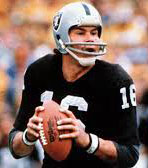
Jim Plunkett
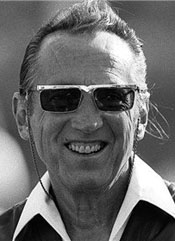
Al Davis
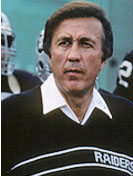
Tom Flores
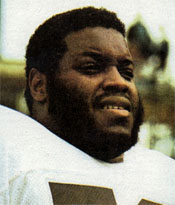
Art Shell
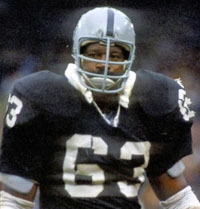
Gene Upshaw
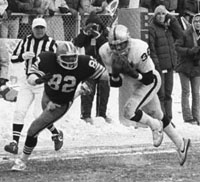
Mike Davis intercepts Brian Sipe.
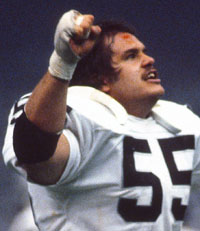
Matt Millen
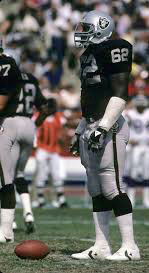
Reggie Kinlaw
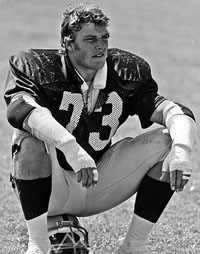
Dave Browning
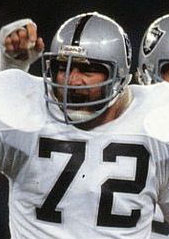
John Matuszak
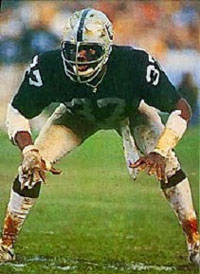
Lester Hayes
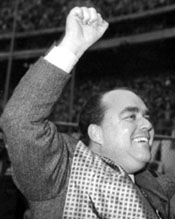
Jimmy Murphy
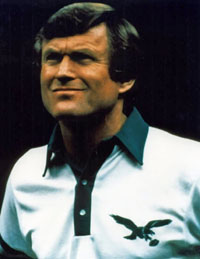
Dick Vermeil
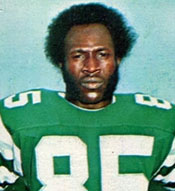
Charlie Smith
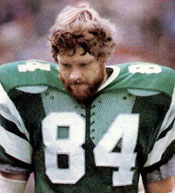
Keith Krepfle
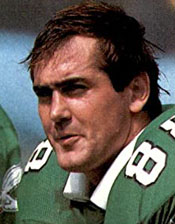
John Spagnola
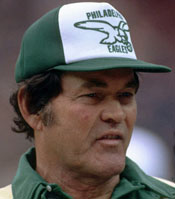
Marion Campbell
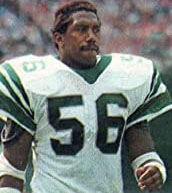
Jerry Robinson
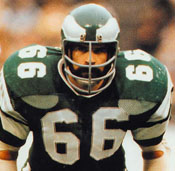
Bill Bergey
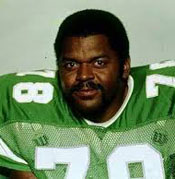
Carl Hairston
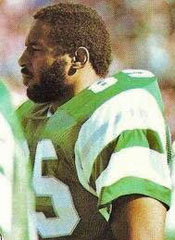
Charlie Johnson
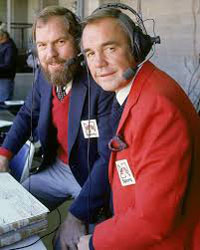
Dick Enberg and Merlin Olsen
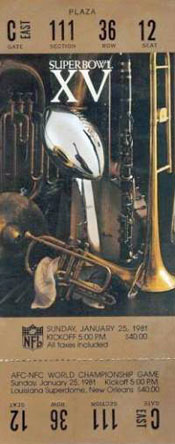
|
|
|
A 80' long yellow ribbon adorned the Superdome in honor of the 52 hostages in Iran who were released five days before the game. |
1979 Philadelphia Eagles
| # |
Player |
Pos. |
Hgt. |
Wgt. |
College |
Exp. |
| 1 |
Tony Franklin |
K |
5-8 |
180 |
Texas A&M |
2 |
| 4 |
Max Runager |
P |
6-1 |
190 |
South Carolina |
2 |
| 7 |
Ron Jaworski |
QB |
6-2 |
195 |
Youngstown State |
7 |
| 9 |
Joe Pisarcik |
QB |
6-4 |
220 |
New Mexico State |
4 |
| 16 |
Rob Hertel |
QB |
6-2 |
195 |
USC |
2 |
| 17 |
Harold Carmichael |
WR |
6-8 |
225 |
Southern |
10 |
| 20 |
Leroy Harris |
RB |
5-9 |
230 |
Arkansas State |
4 |
| 21 |
John Sciarra |
S |
5-11 |
185 |
UCLA |
3 |
| 22 |
Brenard Wilson |
FS |
6-0 |
175 |
Vanderbilt |
2 |
| 24 |
Zac Henderson |
S |
6-1 |
190 |
Oklahoma |
1 |
| 27 |
Richard Blackmore |
CB |
5-10 |
175 |
Mississippi State |
2 |
| 31 |
Wilbert Montgomery |
RB |
5-10 |
195 |
Jackson St./Ab.Chris. |
4 |
| 33 |
Louie Giammona |
RB |
5-9 |
180 |
Utah State |
5 |
| 35 |
Perry Harrington |
RB |
5-11 |
210 |
Jackson State |
1 |
| 37 |
Billy Campfield |
RB |
5-11 |
200 |
Kansas |
3 |
| 39 |
Rob Torrey |
RB |
6-4 |
230 |
Penn State |
2 |
| 41 |
Randy Logan |
SS |
6-1 |
195 |
Michigan |
8 |
| 43 |
Roynell Young |
CB |
6-1 |
180 |
Alcorn State |
1 |
| 46 |
Herman Edwards |
CB |
6-0 |
190 |
California/SDSU |
4 |
| 50 |
Guy Morriss |
C |
6-4 |
255 |
TCU |
8 |
| 51 |
Reggie Wilkes |
LB |
6-4 |
235 |
Georgia Tech |
3 |
| 52 |
Ray Phillips |
LB |
6-4 |
225 |
Nebraska |
4 |
| 55 |
Frank LeMaster |
LB |
6-2 |
240 |
Kentucky |
7 |
| 56 |
Jerry Robinson |
LB |
6-2 |
220 |
UCLA |
2 |
| 59 |
Al Chesley |
LB |
6-3 |
240 |
Pittsburgh |
2 |
| 61 |
Mark Slater |
C |
6-2 |
255 |
Minnesota |
3 |
| 62 |
Petey Periot |
G |
6-2 |
261 |
Northwestern State |
2 |
| 63 |
Ron Baker |
G |
6-4 |
260 |
Oklahoma State |
3 |
| 65 |
Charlie Johnson |
NT |
6-3 |
260 |
Colorado |
4 |
| 66 |
Bill Bergey |
LB |
6-3 |
245 |
Arkansas State |
12 |
| 68 |
Dennis Harrison |
DE |
6-8 |
275 |
Vanderbilt |
3 |
| 69 |
Woody Peoples |
G |
6-2 |
260 |
Grambling State |
13 |
| 71 |
Ken Clarke |
NT |
6-2 |
270 |
Syracuse |
3 |
| 73 |
Steve Kenney |
T |
6-4 |
265 |
Clemson |
1 |
| 75 |
Stan Walters |
T |
6-6 |
275 |
Syracuse |
9 |
| 76 |
Jerry Sisemore |
T |
6-4 |
265 |
Texas |
8 |
| 78 |
Carl Hairston |
DE |
6-3 |
260 |
Maryland-Eastern Shore |
5 |
| 83 |
Rodney Parker |
WR |
6-1 |
190 |
Tennessee State |
1 |
| 84 |
Keith Krepfle |
TE |
6-3 |
230 |
Iowa State |
6 |
| 85 |
Charles Smith |
WR |
6-1 |
185 |
Grambling State |
7 |
| 87 |
Claude Humphrey |
DE |
6-4 |
250 |
Tennessee State |
13 |
| 88 |
John Spagnola |
TE |
6-4 |
240 |
Yale |
2 |
| 89 |
Wally Henry |
WR |
5-8 |
175 |
UCLA |
4 |
| 95 |
John Bunting |
LB |
6-1 |
220 |
North Carolina |
9 |
| 97 |
Thomas Brown |
DE |
6-4 |
245 |
Baylor |
1 |
|
| # |
Player |
Pos. |
Hgt. |
Wgt. |
College |
Exp. |
| 6 |
Marc Wilson |
QB |
6-6 |
205 |
Brigham Young |
1 |
| 8 |
Ray Guy |
P |
6-3 |
195 |
Southern Mississippi |
8 |
| 10 |
Chris Bahr |
K |
5-10 |
170 |
Penn State |
5 |
| 16 |
Jim Plunkett |
QB |
6-2 |
205 |
Stanford |
10 |
| 21 |
Cliff Branch |
WR |
5-11 |
170 |
Colorado |
9 |
| 22 |
Arthur Whittington |
RB |
5-11 |
185 |
SMU |
3 |
| 23 |
Odis McKinney |
CB |
6-2 |
185 |
Colorado |
3 |
| 26 |
Keith Moody |
CB |
5-11 |
170 |
Syracuse |
5 |
| 30 |
Mark van Eeghen |
RB |
6-2 |
225 |
Colgate |
7 |
| 31 |
Derrick Jensen |
RB |
6-1 |
220 |
Texas-Arlington |
2 |
| 33 |
Kenny King |
RB |
5-11 |
205 |
Oklahoma |
2 |
| 35 |
Dwayne O'Steen |
CB |
6-1 |
195 |
California/San Jose St. |
3 |
| 36 |
Mike Davis |
SS |
6-3 |
200 |
Colorado |
3 |
| 37 |
Lester Hayes |
CB |
6-0 |
195 |
Texas A&M |
4 |
| 42 |
Monte Jackson |
CB |
5-11 |
195 |
San Diego State |
6 |
| 43 |
Ira Matthews |
RB |
5-8 |
175 |
Wisconsin |
2 |
| 44 |
Burgess Owens |
FS |
6-2 |
200 |
Miami (FL) |
8 |
| 46 |
Todd Christensen |
RB |
6-3 |
230 |
Brigham Young |
2 |
| 50 |
Dave Dalby |
C |
6-3 |
250 |
UCLA |
9 |
| 51 |
Bob Nelson |
LB |
6-4 |
230 |
Nebraska |
5 |
| 52 |
Mario Celotto |
LB |
6-3 |
230 |
USC |
3 |
| 53 |
Rod Martin |
LB |
6-2 |
210 |
USC |
4 |
| 55 |
Matt Millen |
LB |
6-2 |
260 |
Penn State |
1 |
| 56 |
Jeff Barnes |
LB |
6-2 |
225 |
California |
4 |
| 57 |
Randy McClanahan |
LB |
6-5 |
225 |
Louisiana-Lafayette |
4 |
| 63 |
Gene Upshaw |
G |
6-5 |
255 |
Texas A&M-Kingsville |
14 |
| 65 |
Mickey Marvin |
G |
6-4 |
270 |
Tennessee |
4 |
| 66 |
Steve Sylvester |
G |
6-4 |
260 |
Notre Dame |
6 |
| 70 |
Henry Lawrence |
T |
6-4 |
270 |
Florida A&M |
7 |
| 71 |
Lindsey Mason |
G |
6-5 |
265 |
Kansas |
3 |
| 72 |
John Matuszak |
DE |
6-8 |
280 |
Missouri/Tampa |
8 |
| 73 |
Dave Browning |
DE |
6-5 |
245 |
Washington |
3 |
| 74 |
Dave Pear |
DT |
6-2 |
250 |
Washington |
6 |
| 77 |
Joe Campbell |
DE |
6-6 |
255 |
Maryland |
4 |
| 78 |
Art Shell |
T |
6-5 |
280 |
Maryland-Eastern Shore |
13 |
| 79 |
Bruce Davis |
G |
6-6 |
285 |
UCLA |
2 |
| 81 |
Morris Bradshaw |
WR |
6-1 |
195 |
Ohio State |
7 |
| 82 |
Reggie Kinlaw |
NT |
6-2 |
240 |
Oklahoma |
2 |
| 83 |
Ted Hendricks |
LB |
6-7 |
225 |
Miami (FL) |
12 |
| 84 |
Derrick Ramsey |
T |
6-4 |
230 |
Kentucky |
3 |
| 85 |
Bob Chandler |
WR |
6-1 |
180 |
USC |
10 |
| 86 |
Cedrick Hardman |
DE |
6-3 |
255 |
North Texas |
11 |
| 88 |
Raymond Chester |
TE |
6-4 |
235 |
Morgan State |
11 |
| 89 |
Rich Martini |
TE |
6-2 |
185 |
California-Davis |
2 |
| 90 |
Willie Jones |
DT |
6-4 |
240 |
Florida State |
2 |
|
References: The Super Bowl: Celebrating a Quarter-Century of America's Greatest Game (1990)
Super Bowl Chronicles: A Sportswriter Reflects on the First 30 Years of America's Game, Jerry Green (1995)
Super Bowl: The Game of Their Lives, Danny Peary (ed.) (1997)
The Football Game I'll Never Forget: 100 NFL Stars' Stories, selected by Chris McDonell (2004)
The Ultimate Super Bowl Book, Bob McGinn (2009)
50 Years, 50 Moments: The Most Unforgettable Plays in Super Bowl History, Jerry Rice and Randy O. Williams (2015)
Super Bowl Gold: 50 Years of the Big Game, Sports Illustrated (2015)
The Super Bowl: The First Fifty Years of America's Greatest Game, David Fischer (2015)
The First 50 Super Bowls: How Football's Championships Were Won, Ed Benkin (2018)
|
|
